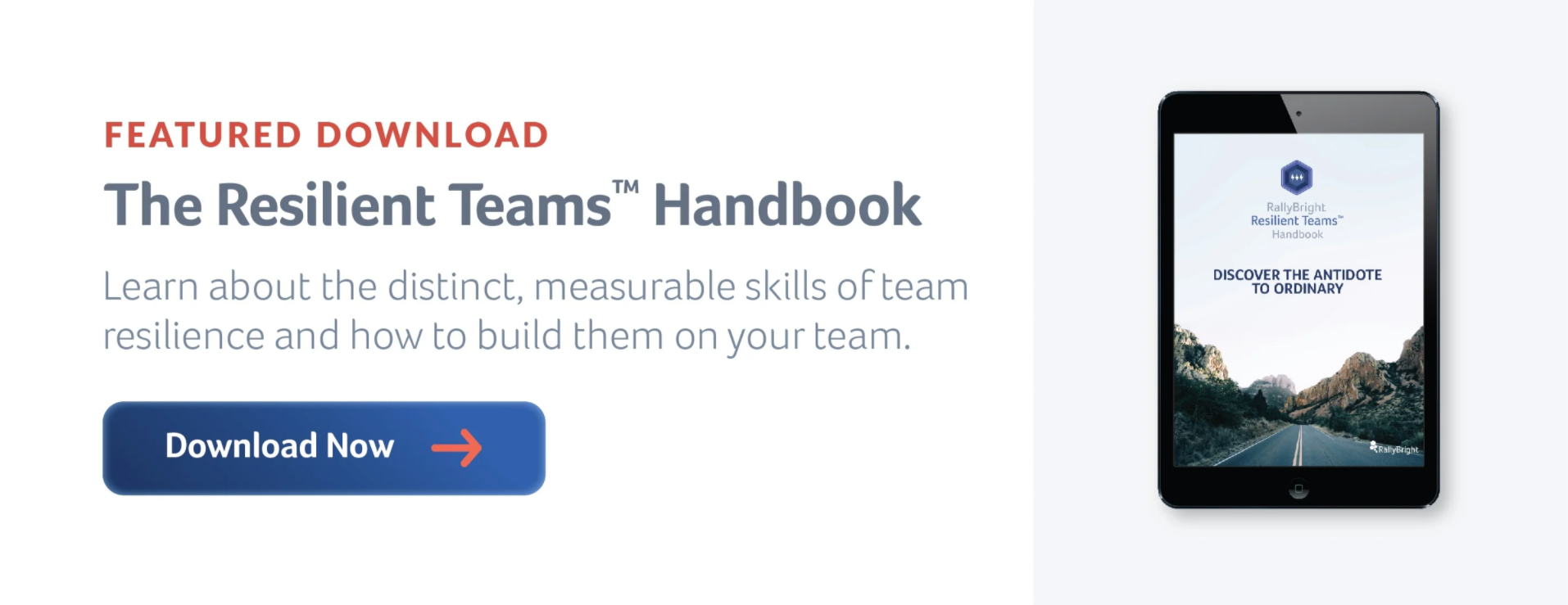Original blog last updated: 04/22/2021
We know that employees who practice optimism at work are more committed, satisfied and high-performing than those who don’t. Thankfully, optimism is contagious, with research showing that team members and leaders have the power to diffuse positivity across their teams. That’s because teams are dynamic—and because the actions of one person can influence the attitudes of others.
When optimism spreads within a team, everyone benefits. Research indicates that team optimism delivers numerous benefits, including better team cohesion, coordination and cooperation. The result? These groups are more engaged with their work and more easily able to achieve their shared goals.
Positive Attitude & Optimism as a Learned State
Research we’ve conducted here at RallyBright shows us that resilient teams are characterized by strength across five dimensions. These are direction, connection, alignment, performance and attitude. Teams with winning attitudes are known for their competitive spirit and unflagging energy as well as their pragmatic optimism.
If you feel like your natural stance is to be a bit of a “Debbie Downer” (or if you’re surrounded by such types at work or at home), there’s good news: Recent research supports the idea that optimism is more of a learned state—as opposed to a fixed trait. Practicing optimism involves training yourself to make positive assumptions about your current and future circumstances. It also involves modeling optimism and spreading positivity to others on your team. Team optimism may not happen overnight, but with time and practice, you can generate more positivity within yourself and across your team by adopting these strategies.
Focus on Strengths, Not Weaknesses: Create a Positive Work Environment
Research tells us that people who believe in their ability to carry out a given task are more optimistic. And that, unsurprisingly, optimistic people perform better at work. This is why it’s so important for you to understand and nurture your talents, as opposed to focusing on your flaws. Adopting this mentality lies at the center of practicing positive psychology, which is concerned with helping people live meaningful and fulfilling lives by leveraging their strengths, developing resilience and enhancing their overall well-being.
To gain a clearer understanding of your strengths, go beyond consulting old performance reviews. Take time to reflect on the kind of work you enjoy, when you’ve been most successful and the unique skills you bring to the table. Then, have real conversations with your peers, managers and friends to discover what they see as your greatest assets. After you’ve gained a clearer understanding of where your strengths lie, talk to your manager about the kind of work you want to take on and how best you can support the team.
You can also help your peers or those you manage realize and leverage their strengths by:
- Providing them with positive reinforcement after a job well done
- Consulting with them on issues that make use of their expertise
- Engaging them in projects or meetings where you know they’ll thrive
These tips are particularly relevant for leaders looking for ways to help increase motivation and engagement across their team.
Foster an Optimistic Climate & Positive Relationships
An organization’s “culture” reflects its values, beliefs and rituals, which influence how people behave. On the other hand, the term “climate” refers to how employees view and interpret the various attributes associated with their work environment. These individual perceptions can shape employees’ expectations about job outcomes, such as happiness and performance. While culture is largely defined and reinforced at top leadership levels, climate is typically perceived and cultivated at the group or individual level. So, while employees and team leads may not be able to single-handedly transform a company’s culture, they can greatly influence the climate of their teams.
Managers and team members can foster more optimistic climates by pushing their teams to frame challenges as opportunities. In practice, this means working alongside your colleagues to overcome mental roadblocks and envision best-case scenarios. When the going gets tough, ask your team questions like:
- “How can we overcome this setback?”
- “What could we learn from this experience?”
- “How could this ultimately advance our business goals?”
- “Could we repurpose the work we’ve already done for something else?”
Evidence from the field shows us that this approach really works. Case in point: A study investigating team-level positivity found that solution-focused statements in meetings were more likely to steer the conversation in a positive direction, whereas problem-focused statements were less likely to do so. It’s simple: When people focus on solutions instead of problems, they’re more likely to adopt an optimistic mindset. We also know that optimistic people are more committed to a goal when it’s a high-priority one. That bodes well for teams working to tackle complex challenges.
Elevate Your Colleagues = Positive Workplace
People feel more optimistic when they feel supported—both in their careers and on a personal level. Elevating your colleagues involves actively listening to them, giving them the benefit of the doubt, championing their ideas, celebrating their successes and helping them overcome failure.
Leaders and team members can help their teams exercise optimism by promoting psychological safety. In the workplace, psychological safety refers to the extent to which employees feel comfortable taking risks, proposing unorthodox ideas and making mistakes in group settings.
High levels of psychological safety promote better team morale because people trust and feel supported by their co-workers. People are also more optimistic about their ideas, which means they feel emboldened to share unconventional thoughts without the fear of being judged. Additionally, research shows that teams that engender psychological safety are more receptive to learning, better at solving problems together and more likely to produce creative and innovative ideas.
You can help promote psychological safety within your team by:
- Encouraging people to openly share their thoughts
- Letting your colleagues speak without interruption
- Reserving judgment
- Working with your co-workers to advance their ideas
- Giving people permission to fail
Given the multitude of benefits, the case for exercising optimism in the workplace is clear. Whether the act is large or small, try practicing optimism by channeling positive thoughts and lifting up those around you. Remember, good attitudes are infectious—and you have the ability to not only cultivate optimism, but also to pass it on to others.
Laura Woods is an organizational psychologist who is passionate about designing high-impact change strategies for organizations and helping employees reach their highest potential. She holds a Master of Science in Industrial/Organizational & Business Psychology from University College London.



